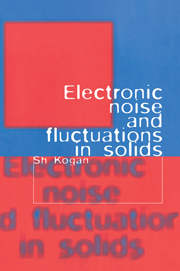Book contents
- Frontmatter
- Contents
- Preface
- Abbreviations
- 1 Introduction: Some basic concepts of the theory of random processes
- 2 Fluctuation–dissipation relations
- 3 Fluctuations in nonequilibrium gases
- 4 Generation–recombination noise
- 5 Noise in quantum ballistic systems
- 6 Resistance noise in metals
- 7 Noise in strongly disordered conductors
- 8 1/f noise and random telegraph noise
- 9 Noise in superconductors
- References
- Subject index
3 - Fluctuations in nonequilibrium gases
Published online by Cambridge University Press: 17 March 2010
- Frontmatter
- Contents
- Preface
- Abbreviations
- 1 Introduction: Some basic concepts of the theory of random processes
- 2 Fluctuation–dissipation relations
- 3 Fluctuations in nonequilibrium gases
- 4 Generation–recombination noise
- 5 Noise in quantum ballistic systems
- 6 Resistance noise in metals
- 7 Noise in strongly disordered conductors
- 8 1/f noise and random telegraph noise
- 9 Noise in superconductors
- References
- Subject index
Summary
One of the most important parts of the physics of fluctuations in solids is the physics of fluctuations in solid-state plasma, i.e., in a gas of charge carriers, electrons and/or holes. The spectral density of electric fluctuations in an equilibrium conductor (zero bias voltage and current) is given by the Nyquist fluctuation–dissipation relation (Sec. 2.2) in terms of the dissipative part of the complex impedance Z(f). It means that the problem of calculation and measurement of noise in an equilibrium state is reduced to the problem of, respectively, calculation and measurement of the complex resistance. This problem is usually considered to be simpler. In an equilibrium system, the spectral density of noise does not contain any information other than that contained in Z(f). However, the fluctuation–dissipation relation holds only in the equilibrium state. For conductors that are in nonequilibrium states, for instance, for conductors with hot electrons in strong electric fields, there is no general relation between the spectral density of noise, on one hand, and any characteristics of the response, frequency dependent or static, of the current or voltage, on the other hand. Thus, the calculation of current noise can not be reduced to the calculation of mean current (e.g., its dependence on voltage) and is an individual problem.
This chapter is devoted mainly to fluctuations in a gas of hot charge carriers (for brevity we call them ‘hot electrons’). As is well known, electrons become hot in strongly biased conductors.
- Type
- Chapter
- Information
- Electronic Noise and Fluctuations in Solids , pp. 67 - 117Publisher: Cambridge University PressPrint publication year: 1996



